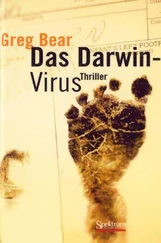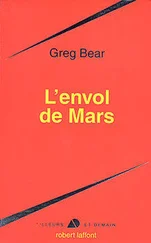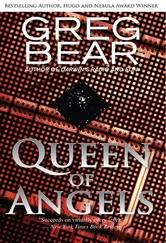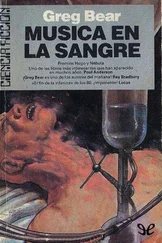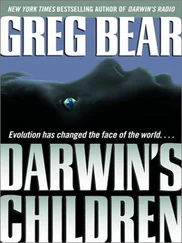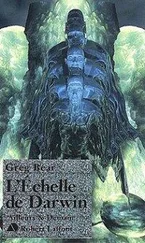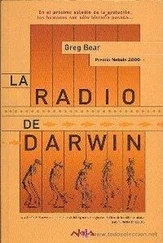“Does any reputable scientist support the proposition that the genome is a self-aware ‘mind,’ able to judge the environment and determine the course of its own evolution?”
Kaye took a deep breath. “It would take me several hours to correct and expand upon that proposition as you state it, but, loosely, the answer is yes. None of them are here, unfortunately.”
“Are their views noncontroversial?”
“Of course not,” Kaye said. “Nothing in this field is non-controversial. And I try to avoid the word ‘mind,’ because it has personal and religious connotations that are not productive. I use the term network; a perceptive and adaptive network of cooperating and competing individuals.”
“Do you believe this mind, or network, could in some way be the equivalent of God?” Jackson stated this without smugness or contempt, to her surprise.
“No,” Kaye said. “Our own brains function as perceptive and adaptive networks, but I don’t believe we are gods.”
“But our own brains produce minds, do they not?”
“I believe the word applies, yes.”
Jackson held up his hands in puzzled query. “So we come full circle. Some sort of Mind — perhaps with a capital M — determines evolution?”
“Again, emphasis and semantics are important here,” Kaye said slowly, and then realized she should have simply dismissed the question with silence.
“Have you ever had the larger scope of your theories peer-reviewed and published in a major journal?”
“No,” Kaye said. “I have expressed some aspects in my published articles on HERV-DL3, which were peer-reviewed.”
“Many of your articles were rejected by other journals, were they not?”
“Yes,” Kaye said.
“By Cell, for example.”
“Yes.”
“Is Virology the most respected journal in the field?”
“It’s an important journal,” Kaye said. “It has published very important papers.”
Jackson let this go. “I haven’t had time to read all of the material in your handout. I apologize,” he continued, getting to his feet. “To the best of your knowledge, would any of the authors whose papers you have included in your handout agree with you completely on the subject of how evolution occurs?”
“Of course not,” Kaye said. “It’s a developing field.”
“It’s not just developing, it’s infantile, isn’t that right, Dr. Lang?”
“In its infancy, yes,” Kaye shot back. “Infantile would apply to those who deny compelling evidence.” She could not help looking at Dicken. He returned her look with unhappy resolve.
Augustine stepped forward again and held out his hand. “We could go on like this for days. I’m sure it would be an interesting conference. What we must do, however, is judge whether views such as those held by Dr. Lang could prove detrimental to the goals of the Taskforce. Our mission is to protect public health, not debate rarefied issues in science.”
“That isn’t exactly fair, Mark,” Marge Cross said, rising. “Kaye, does this seem like a kangaroo court to you?”
Kaye let out a small explosion of breath, half chuckle, half sigh, looked down, and nodded.
“I wish there was time,” Marge said. “I surely do. These views are fascinating, and I share many of them, dear, but we are hopelessly mired in business and politics, and we must go with what we can all support, and with what the public will understand. I do not see the support in this room, and I know we do not have time or the will to engage in a highly public debate. Unfortunately, we are stuck with science by committee, Dr. Augustine.”
Augustine was obviously not pleased by this characterization.
Kaye looked at the vice president. The vice president stared at the folio on his lap, which he had not opened, clearly embarrassed by being stuck in a race in which he had no horse he could hope to ride. He was waiting for the debate to end.
“I understand, Marge,” Kaye said. She could not keep her voice from quavering. “Thank you for making things so clear. I see no alternative but to resign from the Taskforce. My value to Americol is probably reduced by doing that, so I offer my resignation to you, as well.”
Augustine took Dicken aside in the hallway after the meeting. Dicken had tried to catch up with Kaye, but she was far down the hall toward the elevator.
“This didn’t turn out the way I would have liked,” Augustine told him. “I don’t want her out of the Taskforce. I just don’t want her going public with these ideas. Christ, Jackson may have done us a greater disservice—”
“I know Kaye Lang well enough,” Dicken said. “She’s gone for good, and yes, she’s pissed off, and I’m as responsible as Jackson.”
“Then what in hell can you do to put things right?” Augustine asked.
Dicken shrugged loose from his grip. “Nada, Mark. Zip. And don’t ask me to try.”
Shawbeck approached them, his face grim. “There’s another march on Washington planned for tonight. Women’s groups, Christians, blacks, Hispanics. They’re evacuating the Capitol and the White House.”
“Jesus H.,” Augustine said. “What are they trying to do, shut the country down?”
“The president’s agreed to a full defense. Regular Army as well as National Guard. I think the mayor is going to declare a state of emergency in the city. The VP is being flown to Los Angeles this evening. Gentlemen, we should get out of here, too.”
Dicken heard Kaye arguing with her bodyguard. He walked briskly down the hall to see what was happening, but they were in the elevator and the door had closed by the time he arrived.
Kaye stood in the ground floor lobby, hands on her hips, shouting at the top of her lungs. “I don’t want your protection! I don’t want any of this! I told you—”
“I don’t have any choice, ma’am,” Benson said, standing his ground like a small bull. “We are on full alert. You can’t go back to your apartment until we get more agents here, and that’s going to take at least an hour.”
The building security guards were locking the front doors and moving barricades into position. Kaye twirled, saw the barricades, the curious people beyond the glass doors. Steel barriers dropped slowly over the outside entrance.
“Can I make a phone call?”
“Not now, Ms. Lang,” Benson said. “I’d apologize all over if this were my fault, you know that.”
“Yes, like when you told Augustine who was in my apartment!”
“They asked the doorman, Ms. Lang, not me.”
“So what is it now, us versus them’? I want to be outside with real people, not in here—”
“Not if they recognize you, you don’t,” Benson said.
“Karl, for God’s sake, I’ve resigned]”
The agent held up his hands and shook his head firmly: no matter.
“Then where am I going to stay?”
“We’re putting you with the other researchers in the executive lounge.”
“With Jackson?” Kaye bit her lip and stared at the ceiling, shaking with helpless laughter.
62
The State University of New York, Albany
Mitch stared out of the taxi window at the students marching along the tree-lined avenue. People poured out of homes and office buildings along the path of the march. This time, they carried no signs, no banners, but all held their left hands high, fingers stretched out, palms forward.
The driver, a Somali immigrant, lowered his head and peered through the window to his right. “What does that mean, raised hand?”
“I don’t know,” Mitch said.
The march had cut them off at an intersection. The university campus lay just a few blocks away, but Mitch doubted they would get that far today.
“It is scary,” the driver said, glancing over his shoulder at Mitch. “They want something to be done, yes?”
Читать дальше
Конец ознакомительного отрывка
Купить книгу

